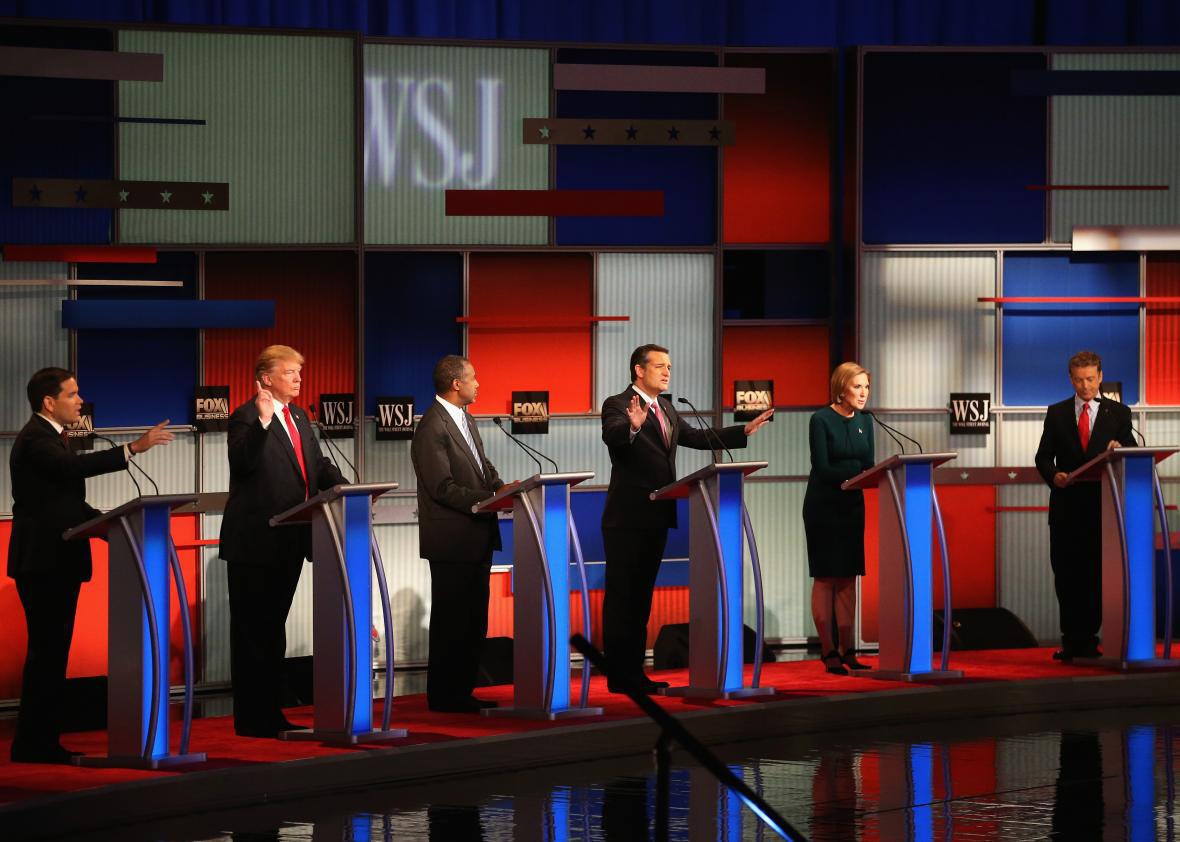It was a tough night for philosophers at the fourth GOP debate. To make a point about skills training, Sen. Marco Rubio said the world needed more welders than philosophers. Sen. Ted Cruz attacked “philosopher kings” for trying to figure out what was happening in the economy. And Gov. John Kasich, who tried at times to get philosophical and even quoted one—Michael Novak on the ethical duties of Wall Street—was clobbered by Donald Trump. “I don’t have to hear from this man,” Trump said after Kasich labeled him as untruthful.
There were no gimmicky or silly questions this time around. The Fox Business moderators stuck to talking about wages, fiscal issues, and national security, and the candidates offered a lot of loose economic bravado and gunplay. But if you are in the camp that thinks the GOP race will ultimately come down to Rubio and Cruz, then you were given more support for that theory. Both had good moments on issues that GOP voters care about, and neither was bested by the others.
Rubio’s moment came in a back-and-forth with Sen. Rand Paul over the size of the budget—a moment where actual differences between the men illuminated policy choices. Paul criticized Rubio’s plan for a refundable child tax credit and increased defense spending. That gave Rubio a chance to play the family and the strong military cards. He argued that if you don’t spend the money America will be in danger, and the crowd seemed to love it. It was the second debate in which he got the better of an exchange aimed at him.
Unlike the last debate where Rubio’s attacker (Jeb Bush) was left diminished, Paul didn’t lose ground. In the age of ISIS, Paul isn’t going to win the GOP nomination by pledging national security restraint, but he was more clear and vital in support of his standards than he has been in the previous debates. (Indeed, one of the evening’s most interesting exchanges revolved around the philosophical question of what it means to be a conservative.)
Cruz’s moment came during a debate over immigration. Bush, who was attempting to be more assertive, criticized Trump and others who were promoting deportation. Bush spoke up for a pathway to citizenship. Cruz replied with a hammer, saying, “It’s offensive that people who oppose amnesty are labeled anti-immigrant.” He had another strong moment when he refused to bail out any large failing banks—a crowd-pleaser that then led to a confusing back-and-forth over bank deposits that seemed to proceed as if the FDIC did not exist.
Cruz had the night’s finest little piece of embroidery. He rose to Rubio’s defense on military spending but then talked about how that spending could be paid for through closing loopholes like the one for sugar subsidies—something Rubio, as a Florida senator, supports.
You can learn something about a candidate from the moment when he chooses not to engage. Rubio didn’t get in the middle of that immigration debate. He was once a champion of comprehensive immigration reform. He wasn’t going to put on the Jeb Bush lead life jacket and sink with him. He knows how to pick his shots.
What about the front-runners? Trump was on an autopilot of sorts. His numbers will presumably stay the same. Ben Carson seemed to be feeling his way through the material much of the time, but like Trump his support will be hard to shake.
If Paul was trying to get the candidates to hew to conservative principles, Bush and Kasich tried to return the conversation to reality. Kasich called for responsibility in tax cutting and ridiculed Trump’s immigrant-deportation plan: “It’s a silly argument. It’s not an adult argument. It makes no sense.” Bush said Trump’s idea that Russia should take care of ISIS was “like a board game. That’s like playing Monopoly or something. That’s not how the real world works.” These were amusing moments, but they’re not likely to elevate either man.
Carly Fiorina was spirited and made her points like a jackhammer. The audience seemed to approve. There was a time when one might have guessed that would help her in the polls, but she’s had trouble making something enduring after her strong turns on stage. In a season where the electorate has blessedly followed their own impulses, it’s hard to determine how any series of exchanges will really play out until the voters speak their mind to pollsters. And even then, will we really know what role this debate played? It’s enough to make you philosophical.
